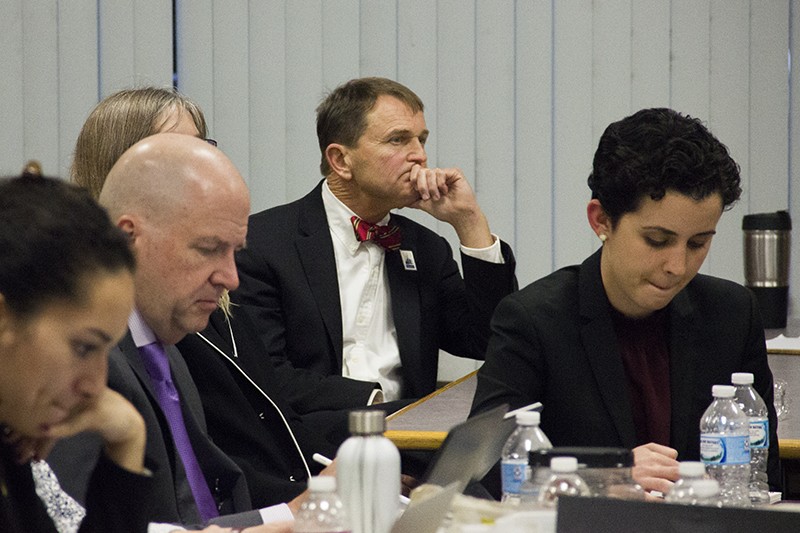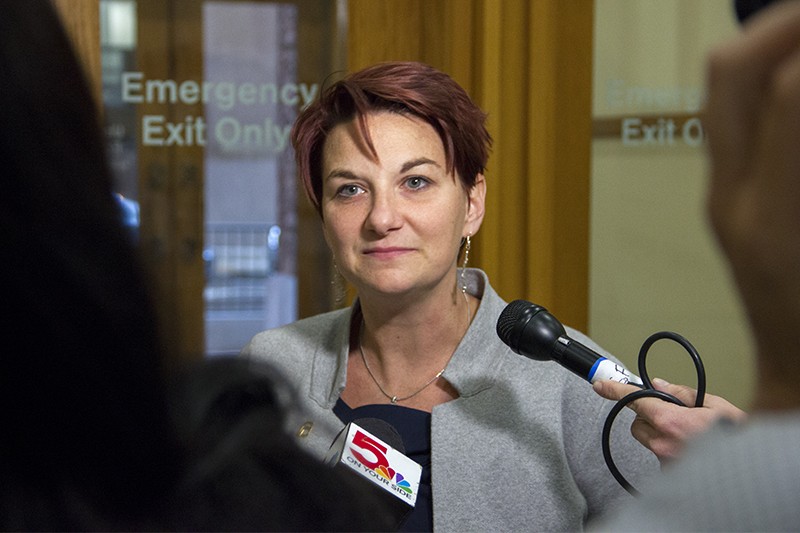
DANNY WICENTOWSKI
DHSS director Dr. Randall Williams (center) is defending the tracking women's periods.
This week, as Planned Parenthood tries to keep Missouri from becoming the only state in the 21st century without an abortion clinic, the bad faith behind the entire venture was revealed courtesy of Dr. Randall Williams, the director of the Missouri Department of Health and Senior Services, or DHSS. The moment came during a hearing on Tuesday, in which he blithely testified that the department had tracked the menstrual cycles of patients at Planned Parenthood's clinic in the Central West End.
That was news to Planned Parenthood and its doctors — and, seemingly, to everyone else. The state's top Democrats have called for investigations, and abortion rights groups want to see his resignation. National outlets jumped up the story, which was first reported by the Kansas City Star, describing a spreadsheet attached to an email to Williams, its subject line referencing "[L]ast normal menses date."
During Williams' testimony, he claimed the data was used to investigate the number of women who had returned to the clinic after "failed abortions."
But since the news broke, Williams and DHSS are spinning up damage control and fending off mounting outrage. Now, as a weeklong series of hearings continues in St. Louis — with the clinic's abortion license hanging in the balance — the discovery of the state's clumsy, spreadsheet-assisted investigation into Planned Parenthood's patients reflects the rot of bad faith at the heart of the Missouri's anti-abortion enterprise.

DANNY WICENTOWSKI
Dr. Colleen McNicholas, who performs abortions at Planned Parenthood's CWE clinic.
For his part, Williams would have you believe that outrage over the tracking of women's periods amounts to a "false allegation." On Wednesday night, DHSS sent out a press release stating that the department had simply used "legally-obtained information which was required by law and which Planned Parenthood routinely submits."
The statement, sent to the Associated Press and others, argued that its review of health information was necessary "to ensure that our laws and health care standards are being met."
But the reason behind that review, and the lengths that state investigators went to conduct it, still baffled Dr. Colleen McNicholas, chief medical officer of Reproductive Health Services of Planned Parenthood of the St. Louis Region. In an interview after Wednesday's hearing, McNicholas called the tracking of her patients' menstrual cycles, "A real violation of the trust that patients have with their physician and healthcare providers."
"I think the public outrage reflects the reality," she added. "The public does not expect the department of health to be going through their records. I can think of no medical reason for why they were collecting that information."
So what is going on here? At issue are a number of "failed abortions" reported by Planned Parenthood's clinic since January. That number, according to McNicholas' testimony on Wednesday, totaled two cases out of more than 4,000.
Williams, though, testified Tuesday that a state investigator found the clinic had failed to fill out a "complication report" for a patient whose abortion required five separate attempts before it took. Another case involved a woman pregnant with twins, requiring a second abortion weeks after the first. The failed abortions, Williams claimed, led to an aggressive investigation that included, yes, DHSS calculating the last menstrual period of patients.
That effort produced two other cases the state alleges were "failed abortions," though Planned Parenthood disputes that, and has repeatedly accused the state of "cherry picking" cases as a means to justify ending of abortion access in Missouri.
On Wednesday, the state's focus on these "failed abortions" ran into the expert testimony of both McNicholas and Dr. Daniel Grossman, a San Francisco-based obstetrician-gynecologist who similarly disputed the state's charge that the Planned Parenthood doctors had mishandled various treatment decisions that led to multiple abortions or the need for hospitalization.
Instead, Grossman testified that those cases represented either rare instances — such as a doctor missing a twin — or cases that were not actually failed abortions, such as one patient cited by the state who, Grossman said, "did not leave the facility thinking she had had an abortion." Grossman also testified that he "did not have any concerns" about the way those cases were handled.

DANNY WICENTOWSKI
In May, protesters occupied the Wainwright Building in St. Louis, demanding the state renew Planned Parenthood's abortion license.
Much of the testimony on Wednesday tilted on clinical decisions made by McNicholas and other doctors in those four cases, leading to back-and-forth between DHSS' attorneys and the people with actual medical degrees and experience as abortion providers.
After the hearing yesterday, McNicholas told Riverfront Times that Planned Parenthood already tracks failed abortions, and that it provided its records to DHSS as part of the license renewal process — records that DHSS apparently believed were incomplete.
However, it appears that Williams is now trying to distance himself from the period-tracking spreadsheet. In a statement sent to the Star last night, DHSS said Williams "did not ask for, see or know anything about the spreadsheet, which was put together by regulators." DHSS went on to claim that email's subject line, "Director's request," was actually made in error.
On the other hand, DHSS' lead investigator — that is, the person most directly in the role of the "regulators" mentioned in the above DHSS statement — has already testified this week that it was Williams, a gynecologist/obstetrician himself, who made the clinical judgments while evaluating Planned Parenthood's application to renew its abortion license.
And so from period tracking, DHSS has moved to finger pointing. Far from exposing Planned Parenthood's misdeeds, the hearings this week have so far only deepened questions about the state's basis in denying the abortion license to the sole remaining abortion clinic in the state.
In May, when it became clear that DHSS would not renew the clinic's abortion license, Planned Parenthood took the matter to court, seeking a restraining order to allow patients to receive abortions while the two sides fought it out. A St. Louis city judge then sent the matter to the Administrative Hearing Commission, a state body reserved for disputes over regulations.
The hearings, which run through Friday, are presided over by a single commissioner, Sreenivasa Rao Dandamudi, who will decide Planned Parenthood's appeal. His ruling is not expected for several months.
But while this latest chapter is notable for evidence of DHSS' willingness to use private medical records to build its case against Planned Parenthood, it strikes a familiar tone in the broader saga of abortion rights in Missouri: It is a state where pro-life politicians have spent years bragging about the closure of abortion clinics while simultaneously insisting that the very policies restricting abortion access — such as medically unnecessary pelvic exams and requirements for abortion doctors to have hospital admitting privileges — were implemented out of concern for patient safety.
That bad faith argument has led, perhaps inevitably, to the absurdity of a period-tracking spreadsheet. And even if no one at DHSS wants to take responsibility for it, it reflects the political and policy forces that have successfully shuttered every other abortion clinic in the state. It's same force that passed an eight-week abortion ban lacking exception for rape and incest, a measure that would have made the vast majority of abortions illegal in Missouri, had it not been blocked by a federal judge in August.
For Planned Parenthood and its supporters, the doublespeak from Missouri officials can't obscure the political reality of the state, and it's no wonder the organization just opened a new health facility in Illinois to help take on Missouri's abortion refugees. It's as clear as Governor Mike Parson saying he wants to make Missouri "the most Pro-Life state in the country!" The bullshit at play speaks for itself.
And it doesn't take a spreadsheet to recognize it.
Follow Danny Wicentowski on Twitter at @D_Towski. E-mail the author at [email protected]





